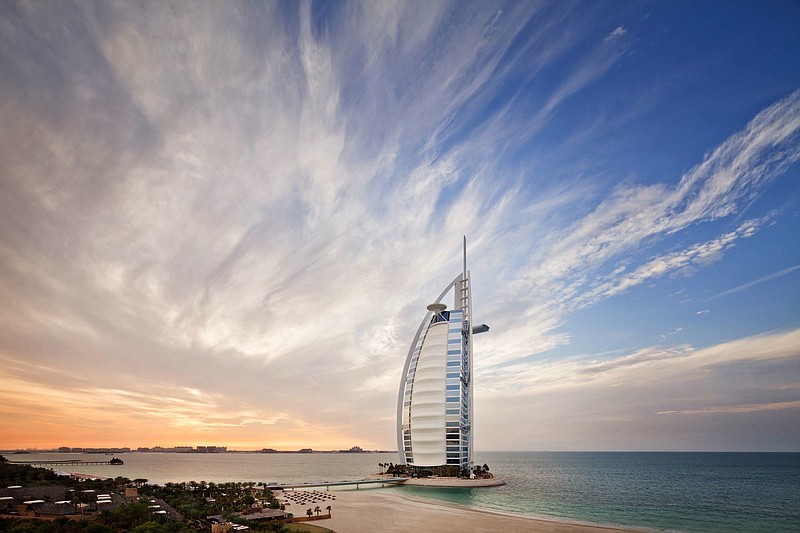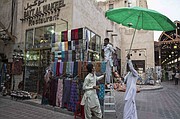As excited as I was to visit the famed tourist haven of Dubai, I barely knew where it was on a map.
I found it east of Saudi Arabia, bordered by Qatar and the Persian Gulf. The United Arab Emirates, Dubai's homeland, seems just a tiny place in terms of the world. Fifty years ago it was home to nomads, camels and far-reaching oceans of sand.
Then they discovered oil.
The money flooded in, along with amazingly designed modern buildings, beachside resorts and a vibrant, infamous night life.
Dubai is a world within a world. Westerners sunbathe on the beaches in barely-there apparel while men in white robes and checkered headdresses stroll nearby, their elegant wives and sisters dressed from head to toe in black abayas. These women, though mysterious to us, often appear in restaurants and shopping districts with designer handbags, gorgeous jewelry, full face make-up and high-heeled sparkly sneakers. In Dubai, values different than traditional Islam are tolerated in an effort to make their Western visitors more comfortable. After all, their economy is sustained on the more than 80 percent of foreign-born residents living, working and vacationing there.
My friends and I had some trepidation about visiting the Middle East in the middle of the age of global terror, but we'd heard the UAE was still a very open place with no travel restrictions at the time. Being effervescent pilgrims, we decided to brave the risk. I went with three girlfriends.
When we boarded our plane, we were surprised to see hardly anyone in Middle Eastern attire. However, once we got off the plane in Dubai, many women walked off with their heads covered, having transformed themselves in the bathrooms. Though we'd left a snowy Munich in the dead of winter, air in the UAE was decidedly pleasant, in the 70s and not nearly as arid as might be expected. The sun beamed down on us happily as we arrived at our hotel in the middle of an urban district near the port; we took quick naps - we'd traveled six hours on a night flight - then went out to explore.
The hotel staff told us about the Gold Souk, a place to buy jewelry at great prices plus "much, much more." We entered an open market just like the ones I'd always imagined, an exciting and robust array of narrow lanes made for walking. Colorful cloth laid with sparkly jewels peaked at us from shop entrances; there were headdresses of every imaginable color, overly friendly shopkeepers waving us toward their wares and people of all colors and sizes. I overheard a group of girls speaking English with Western accents; they were dark-skinned and covered from head to toe. I dared to ask them, "Hi, are you from America?"
"No," the eldest answered. "We're Canadian, but we live here now."
"Do you like it?" I asked again.
"Yes, it's good," she answered.
The other girls smiled. They appeared happy to be together on their Saturday shopping excursion.
After a night's sleep, we rose ready to tackle the full day. On tap first was a dune-bashing session in the desert. Our driver picked us up in a white SUV, and we took off toward the Arabian Desert to ride the dunes. The car curved up and down the sandy hills, sometimes careening dangerously to the side and just righting itself as we headed down the other side of the shifting dunes. We howled, screamed, laughed and begged for mercy. Finally finishing the journey, we joined a caravan of other white SUVs and parked in front of a makeshift village where colorfully decorated camels were resting on their legs right outside the gate, kissing each other and chewing.
We were told to climb aboard any of the camels and off we went on a ride that took us in a wide circle and back again. It lasted about two minutes, but it was more than enough. My camel looked tired and I wondered if his knees were hurting.
We left the peaceful creatures to enter a compound. In the dead center was a stage and all around were traditional rugs, big floor pillows and low tables. We headed for a table, sat down for an appetizer, then got up again to shop. There was a place to purchase belly-dancing attire, a shisha (Middle-Eastern smoking bar), a woman painting henna tattoos(plant-based and temporary) on individuals' hands and a somber-looking man holding a falcon.
When dinner was served, the crowd of foreigners rushed forward to enjoy delicious Pakistani/Emirati entrees of fish, chicken, lamb, rice and veggies. After this was a strange show involving a man whirling around with lights that were attached to his costume. They blinked on and off and changed colors with his routine. Afterwards, a woman gave an energetic belly-dance performance as the sun retreated behind the dunes and the stars appeared like curious lights above.
Our driver came around to tell us it was time to go, but we begged to have our hands tattooed with henna first, after which we scurried back to our car and on to our Dubai hotel.
Next day, we took a day trip to Abu Dhabi, capital of the Emirates. We brought our colorful dresses with us, anticipating that we would wear them into the Great Mosque. We found the woman's entrance and dressing area and joined a small crowd of other women who were changing into the state-provided abayas since covering was required. We donned our dresses then appeared before the clothing guards for approval. The woman there, who told us she was from the Philippines, nodded and smiled at us, giving us permission to enter the mosque.
Inside was a dazzling display of pearly whiteness, artistic detail, piety and beauty. We were only allowed to skirt the outermost area, but we admired the turrets, a glassy white sea of porcelain meant for praying along with several pools of water and columns etched with beautiful carvings.
In the bathroom, I found myself facing a squatter toilet and, since I didn't know that Western-style toilets were on the other side, decided to quickly refresh my knowledge of the rare skill of using a restroom without toilet paper (water was provided) or a throne to rest upon. I managed.
Back outside, we left the mosque, changed back into modest street clothes and jumped back into the SUV, where our new driver, a sweet Pakistani man who stopped at a gas station to pick up cool water and chewing gum for us, took us to a "museum" where everything was beautifully arranged - and for sale. We admired fine jewelry, tapestries woven with precise lines of gold, beautiful scarves, tablewares and much more. When one in our group decided to make a purchase, we fell into amazed silence as the hosts scurried to draw up paperwork and provide her with a lightbox with which she could both protect and admire her new treasure.
We then sped off to an artisan village by the ocean, put our feet in the sand and browsed the village, where we met a weaver, observed glass blowers, wood carvers and more. From here we attempted to visit the palace of the crown prince of Dubai and our driver told us over his shoulder, "Please cover your heads." When we approached the gate, however, we were told no visitors without pre-approved passes could enter. So we settled for a drive down to the fruit-and-date market.
At this point, our time had come to an end. We gathered our things back at the hotel and headed to the airport. Arriving near midnight, the airport was wide awake, full of people behaving as though it was the middle of the afternoon.
Feeling rather free and chatty, we asked someone we'd newly met about certain political perspectives in the area, and he quickly told us that they were not allowed to discuss politics and definitely not encouraged to offer critique of the powers that be.
Apparently Dubai is a place that is relatively free for the Middle East, but not as free as the West.

